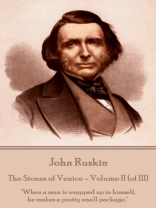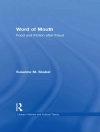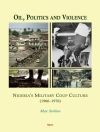John Ruskin was born on February 8th, 1819 at 54, Hunter Street, Brunswick Square, London. Ruskin is now recognised as the pre-eminent English art critic of the Victorian era. His talents and interests were diverse and complex. He was also an art patron, draughtsman, water-colourist, a prominent social thinker and philanthropist. His writing was across subjects from geology, architecture, myth, ornithology and literature to education, botany and political economy. As well Ruskin also wrote essays and treatises, poetry and lectures, travel guides and manuals, letters and even a fairy tale. Ruskin’s earliest writings were initially elaborate but over the course of his long career he gradually moved to a far plainer form which communicated his ideas in a simpler and more effective way. All his writings have a common core of emphasising the connections between nature, art and society. He first came to widespread attention with the first volume of Modern Painters, published in 1843, an extended essay in defence of the work of the painter J. M. W. Turner in which he argued that the principal role of the artist is "truth to nature". (He would later on the death of Turner be an executor of his will). From the 1850s he championed the Pre-Raphaelites who were much influenced by his ideas. As his style developed so did his social concerns and increasingly he voiced and wrote about his social and political issues. Unto This Last (1860, 1862) marked the shift in emphasis. In 1869, Ruskin became the first Slade Professor of Fine Art at the University of Oxford, where he established the Ruskin School of Drawing. In 1871, he began his monthly "letters to the workmen and labourers of Great Britain", published under the title Fors Clavigera (1871-1884). During the publication of this complex and deeply personal work, he developed the principles underlying his ideal society. As a result, he founded the Guild of St George, an organisation that still endures to this day. John Ruskin died on January 20th, 1900 at age 80 at Brantwood in Coniston, Lancashire. Part of his numerous writings concerned his work on Venice in three volumes: The Stones of Venice. He visited Venice in November 1849 with his wife, Effie, and stayed at the water-fronted Hotel Danieli. Their six-year marriage was never consummated and for Effie, Venice provided an opportunity to socialise, while for Ruskin it was a venue to engage in more solitary studies. In particular, he made a point of drawing the Ca’ d’Oro and the Doge’s Palace, or Palazzo Ducale, fearing they would be destroyed by the occupying Austrian troops. Ruskin made extensive sketches and notes for the three-volume work, which soon developed from a technical history of Venetian architecture, from the Romanesque to the Renaissance, into a broad cultural history. Cleverly Ruskin managed to reflect his own view of contemporary England and to weave in a warning about the moral and spiritual health of society. Ruskin argued that Venice had slowly deteriorated. Its cultural achievements had been compromised, and its society corrupted, by the decline of true Christian faith. Instead of revering the divine, Renaissance artists honoured themselves, arrogantly celebrating human sensuousness. It is a work of immense worth both culturally and artistically.
John Ruskin
Stones of Venice – Volume II (of III) [EPUB ebook]
"When a man is wrapped up in himself, he makes a pretty small package."
Stones of Venice – Volume II (of III) [EPUB ebook]
"When a man is wrapped up in himself, he makes a pretty small package."
Beli ebook ini dan dapatkan 1 lagi GRATIS!
Bahasa Inggris ● Format EPUB ● Halaman 239 ● ISBN 9781787372818 ● Penerbit Copyright Group ● Diterbitkan 2017 ● Diunduh 3 kali ● Mata uang EUR ● ID 7000242 ● Perlindungan salinan Adobe DRM
Membutuhkan pembaca ebook yang mampu DRM












